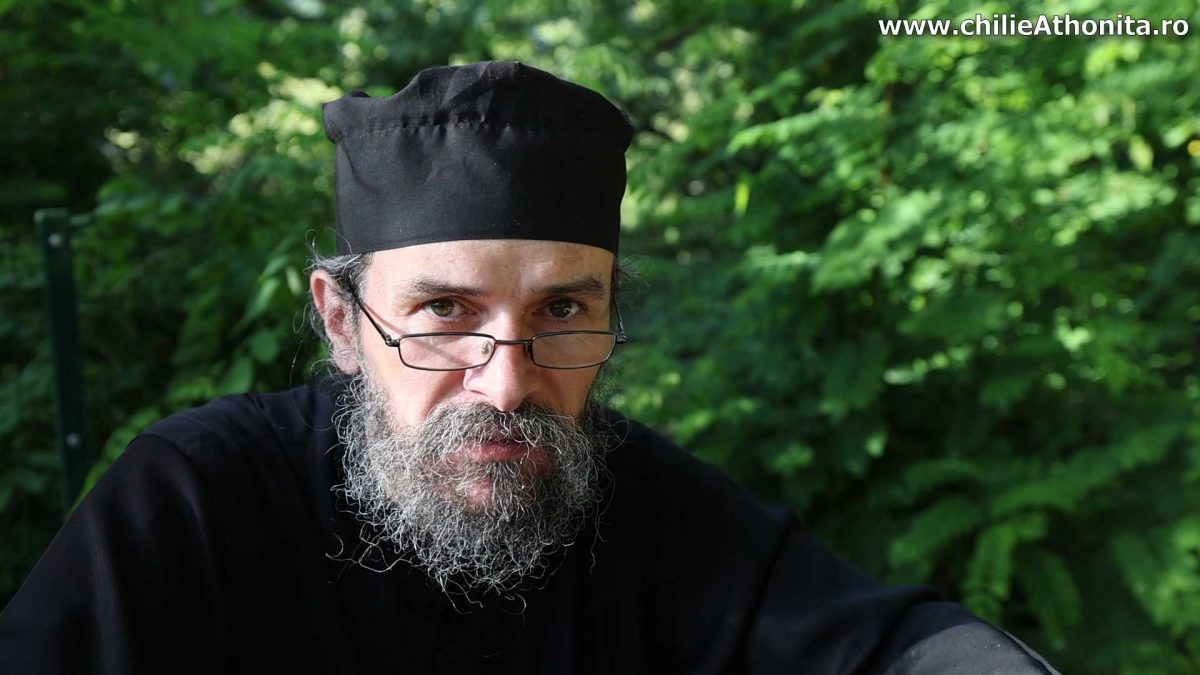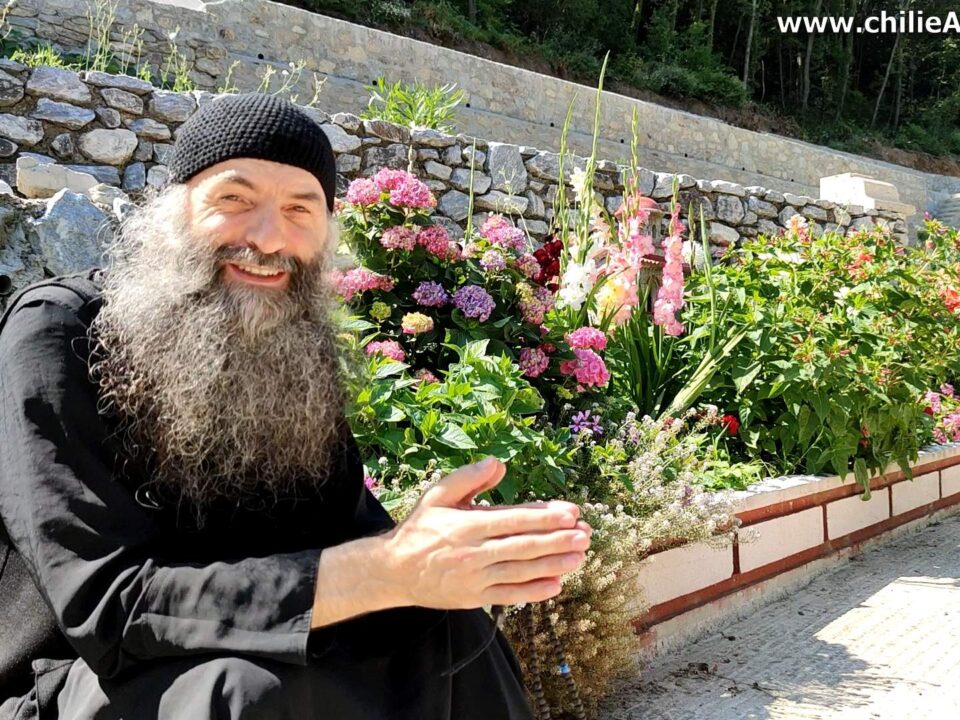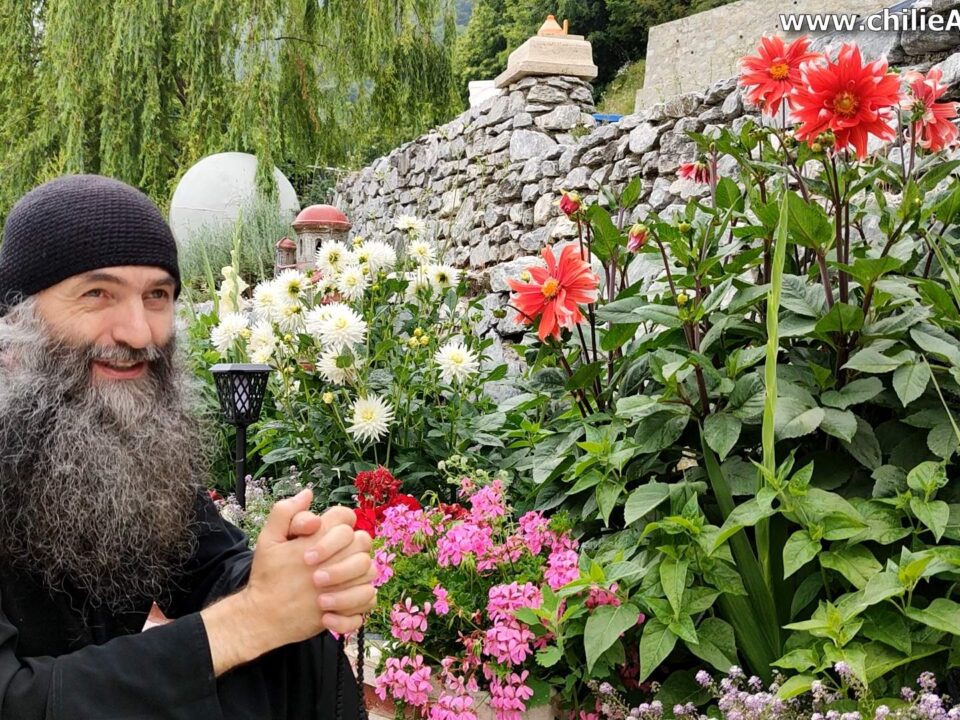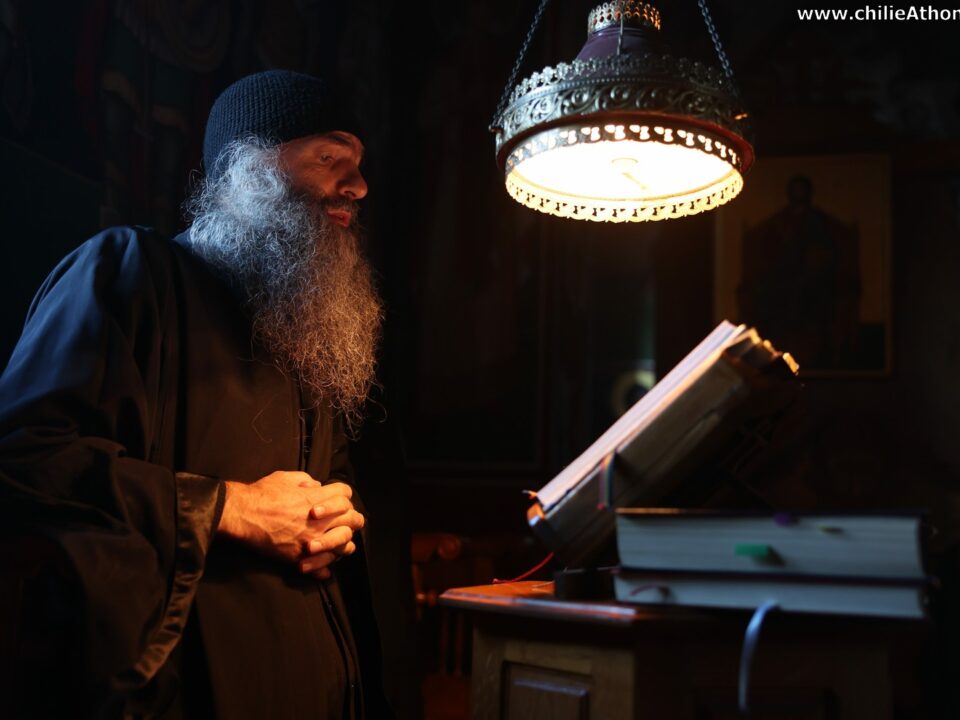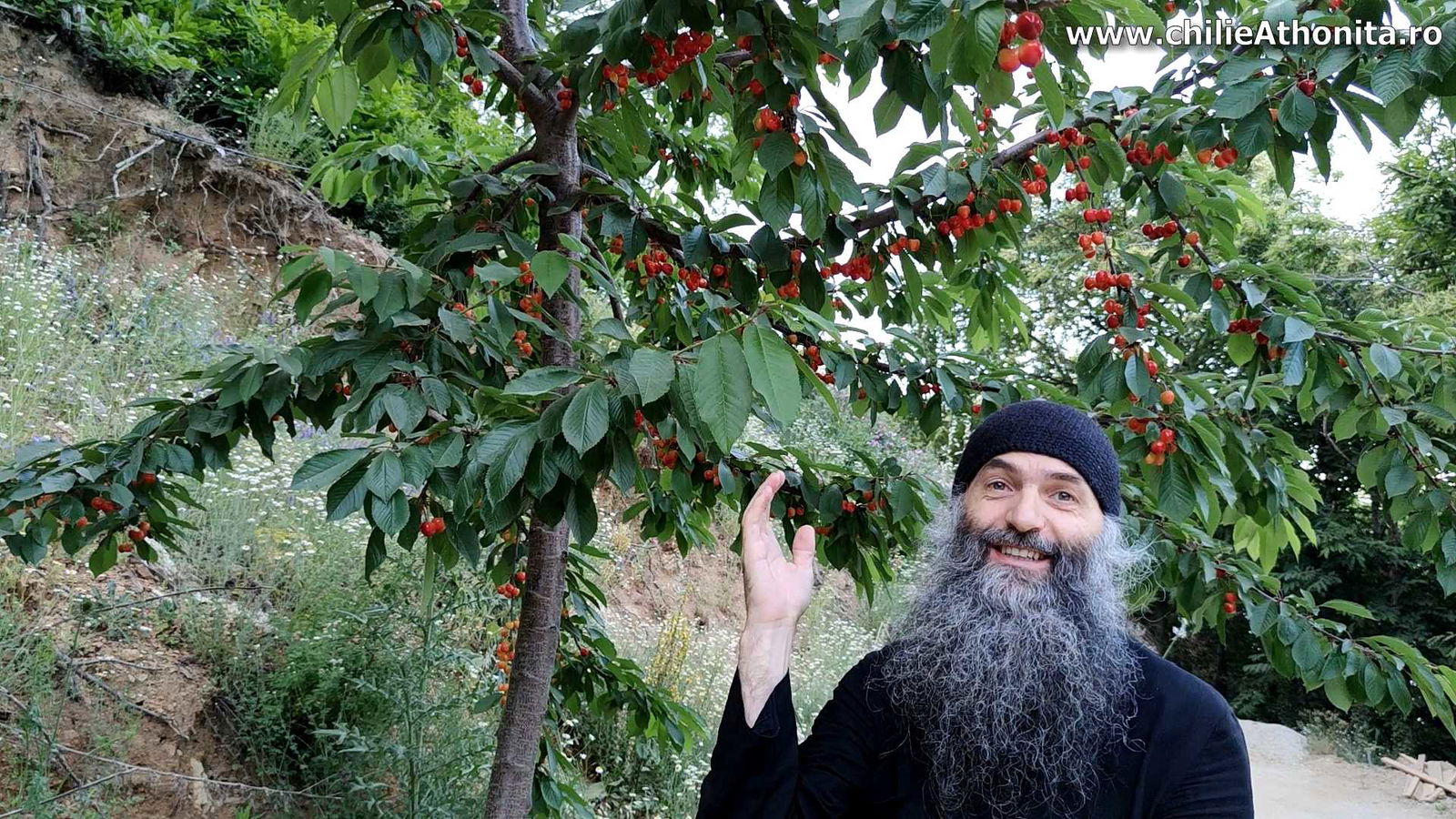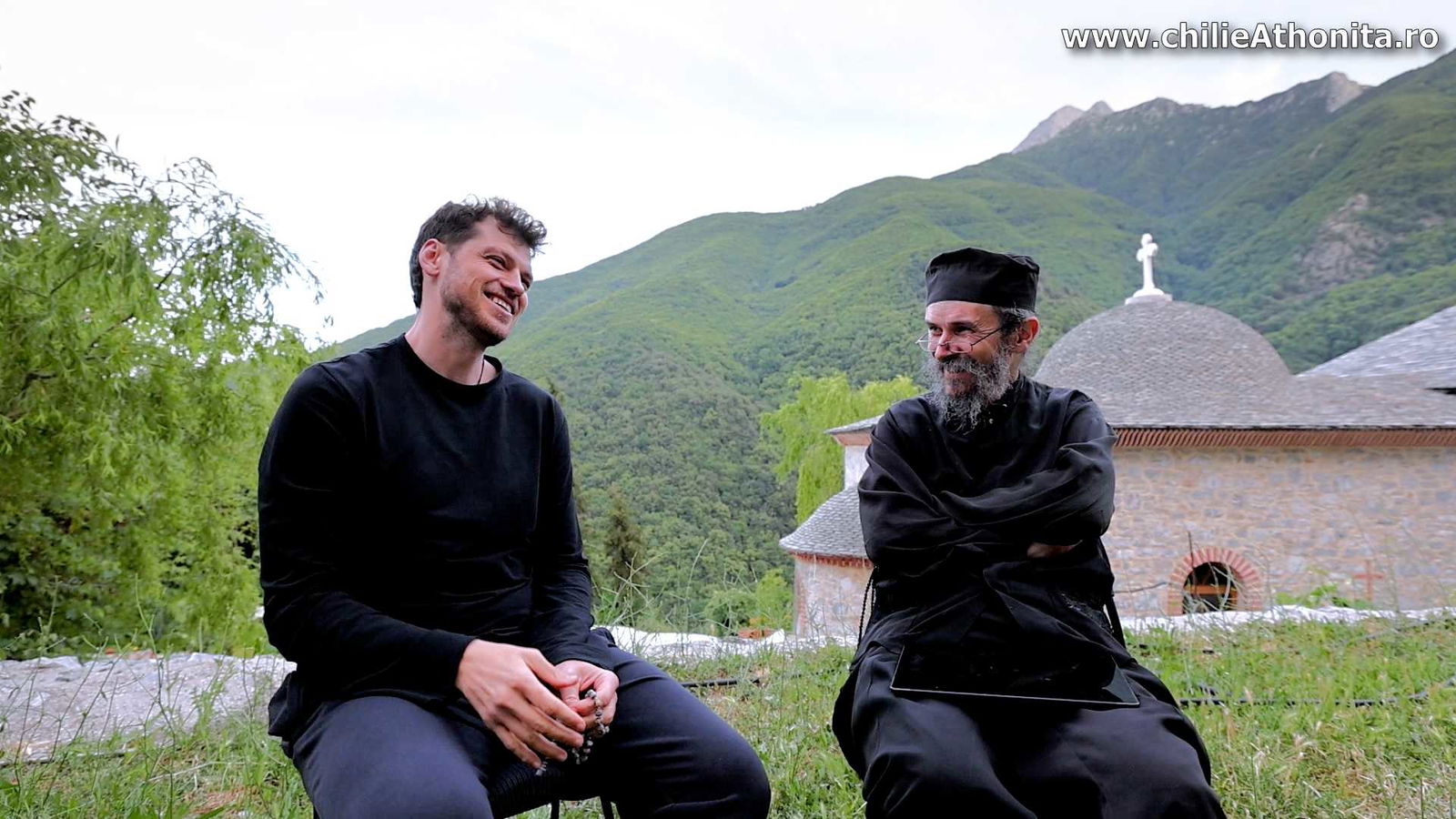How does the Holy Spirit work? What is the meaning of the Descent of the Holy Spirit? Are there still miracles to this day in which the Holy Spirit works directly? Does the phenomenon of “speaking in tongues” still exist?
The answers to all these questions, as well as to many others, you will find in the present video.
Enjoy!
Glory to the Father, and the Son, and the Holy Spirit. Now and forever and unto the ages of ages. Amen.
Through the prayers of our Holy Fathers, Lord Jesus Christ, Son of God, have mercy on us! Amen.
Today we’re going to talk a little bit about the Holy Spirit and also about the ecumenical character, the global character of the Church. You should know that the Holy Spirit, being God, wants all people to be saved and because of this He has a global character, an ecumenical character, a “catholic” character, but not in the sense of the Catholic Church, careful here!
Catholicism is not even a church because we believe in one holy, ecumenical (catholic) and apostolic church. [in Romanian a term meaning “ecumenical” is used rather than the term “catholic”] “Ecumenical” in the original Creed, in Greek, is “katholiki”. So it should have been translated, “in one holy, catholic and apostolic church” but it is not translated that way [in Romanian]. Why? Lest there be confusion with Catholicism. And actually, this ecumenical character of the Church can be and often is translated from the word “ikumeniki”. Ikumeni in Greek means global, ecumenical, general. And hence the ecumenical character of the Church.
Not ecumenist, careful here! We are going to talk about these differences very briefly. The biggest difference is – the ecumenical character of the Church is based on the true faith, on the true way, on Orthodoxy. So we want everyone to come to the knowledge of the truth as the Holy Scripture itself says, but that does not mean that we will deviate from the true path, from the therapeutic path.
Because if we put in 5%, the others put in 5%, and others put in 10%, then things are diluted and already great problems arise. It doesn’t mean that the others are bad people. They’re very good people. But their teaching of faith, the path they took of course has problems.
I have my tablet in front of me, my screen, to quote from the Holy Scripture because, as I have told you many times, I prefer to quote with the text in front of me, and not from memory because, we are, after all, talking about the Holy Scripture.
What is said at the Descent of the Holy Spirit? It says the following:
“And when the day of Pentecost was fully come, they were all with one accord in one place.”
So in the first verse we see that they were all together. From here you can see this ecumenical character, this general character, “katholikos” in Greek – not to say catholic because, in the end, again associations will be made with Catholicism. Unfortunately, in Catholicism, the Holy Spirit no longer exists as it should be. Why? Because they broke away from the Church because they make the Holy Spirit someone other than He actually is. That is, they do not make Him, but they consider that the Holy Spirit is someone other than He actually is. And because of this, although they are called Catholics, meaning general, catholic, ecumenical, they are not so because they do not have the fellowship that they must have with the ecumenical Holy Spirit, the catholic Holy Spirit.
And as I said:
“When the Day of Pentecost had fully come, they were all with one accord in one place.”
So the Holy Spirit comes in this unity, in this synod.
And you should know and we must mention that even a hermit can be in unity. Why? Because he is in this unity of the global Adam.
So we’ve talked about this a lot of times, and it’s not about the unity of the bodies, it’s about the unity of the spirits, the unity of faith. Do you understand? That’s very important in terms of the ecumenical character of the Church because of course, for theologians, this is very clear, but I speak for everyone and so you should know that, yes, the Church is one in spirit and it is no one bodily, so to speak. So we’re not talking about spectators of a sport, we’re not talking about the spectators at a football game, we’re talking about unity in spirit.
And the moment a holy man, a spiritual man is in the spirit, in the unique spirit, in the ecumenical spirit, in the global spirit, in the “katholikos” spirit, in the, let’s say it, the catholic spirit, (although I do not like this word, because as I said it has certain connotations) in the ecumenical spirit, in that moment even the hermit in question is in unity, is together in the same spirit as the Holy Scripture says and therefore receives the Holy Spirit.
And here it says:
“And suddenly there came a sound from heaven…”
Why “suddenly”? Because people do not receive the Holy Spirit when they want, but when the Spirit wants, that’s when the Spirit comes, because the Spirit blows where He wants.
“And suddenly there came a sound from heaven, as of a rushing mighty wind, and it filled the whole house where they were sitting.”
What does this mean? It means that the Spirit – the rush of wind – it can’t be translated differently, but in Greek, Pnevma, also means the rush of wind, but it also means Spirit. Understand? So that’s what the Holy Scripture is referring to there. So the Spirit came as a totally spiritual force, as a wind, as something purely immaterial, but as it says here, “…as of a rushing mighty wind, and it filled the whole house where they were sitting.”
That is, the Holy Spirit is covering us, you should know, and the Holy Spirit is alive, it is active, it is powerful. So it doesn’t turn people into idlers, it makes people more alive than the rest of us.
So the person who has the Holy Spirit, brethren, is not sluggish, but is someone much more alive than we are. Because very often, there is among people this idea – apropos of Catholic influences – that the saint is someone somewhat cut off from the world, in the sense of listlessness, in the sense that the saint doesn’t understand, he does not know, he is apathetic… No. The person with the Spirit is the most alive of all people because this wind full of grace and truth comes and makes people alive.
And beyond that – I’ve told you this before – look at all the movies, all the recordings of holy people; at St. Cleopas, St. Dumitru Stăniloae, and you will see there how alive these people are, even if they are full of the Spirit, full of this delicacy of the Holy Spirit.
Continuing:
“Then there appeared to them divided tongues, as of fire, and one sat upon each of them.”
Tongues as of fire. Alright, what does “tongues as of fire” mean? Tongues as of fire refer to the word, but a word that is not apathetic, not a sluggish word, but a warm, enlightening word, from the heart, and especially a personal word. Why personal? Because it says here: “…and one sat upon each of them.”
I am quoting now from the Acts of the Apostles, from the Holy Scripture. We don’t play with that. So the Holy Spirit is both unitary and ecumenical, and general, let’s say “katholikos”… but it is also personal for each of us. This is the great mystery of the Church, which no one, in any political-social system can reproduce, this unity in diversity. That is, the Church of the Holy Spirit is totally personal and totally communal, totally unitary. It is a great mystery and as I said, it only happens in the true Church.
In other congregations, for example, for the Catholics, as I said, the personality is crushed in favor of the unity, the pseudo-unity around the pope, around the Archbishop of Rome. And for Protestants, it’s exactly the opposite, that is, there is a lot of pseudo-personality, a lot of singularity, a lot of ego, of “I” despite the unity. Because as you probably know, there are a lot of Protestant denominations.
At one point, his Eminence Hierotheos of Nafpaktos, with whom I spoke, told me that there were around 10,700. Something like that. Don’t quote me, I don’t remember exactly, but it’s a huge number like that.
So once again, to emphasize, we are talking about the Orthodox Church in which solely this mystery of unity in diversity is found, [this mystery] of the absolute potentiation of the personal character of each of us, but also of our unity of faith. And this is done only in the Holy Spirit. So we are talking about, brethren, a miracle that happens continuously as we live.
“And they were all filled with the Holy Spirit and began to speak with other tongues, as the Spirit gave them utterance.
And there were dwelling in Jerusalem Jews, devout men, from every nation under heaven.”
So you see, the Holy Spirit tells the Apostles, that is, gives them the charisma, but also tells them by deeds to preach to everyone. So to preach to the Gentiles also and to all the others who were not heretics, but pagans. But of course, this preaching is not done either with hatred or with a feeling of superiority on our part, but always with love, as you can see further down, I will not read you now the whole text of Acts of the Apostles chapter 2.
Because you will see the Holy Apostle Peter in his sermon, he does not scold them, he does not call them heretics, he does not say “Scoundrels, are you not ashamed?” Rather he speaks to them with a lot of love a lot of love and of course, at some point, he reminds them like this: “Therefore let all the house of Israel know assuredly that God has made this Jesus, whom you crucified…” he is saying that indeed “you crucified” “…both Lord and Christ.”
So he does not say that he [Peter] also crucified Him, because he did not crucify Him, but his sermon is so full of love that they do not feel guilty. The pagans, the Jews (well they were not pagans they were Judaized… some actually were pagans, they were Parthians, Elamites and so on) because of this were pierced to the heart. It says:
“Now when they heard this, they were cut to the heart, and said to Peter and the rest of the apostles, ‘Men and brethren, what shall we do?'”
Do you understand? So the type of sermon, this tendency of some of us in the Church to crush others saying that they are heretics, that they are… God forbid! Of course, the others have problems in their faith, great ones and there are indeed some heresies, but these heresies – one – must be condemned by the synod of the Church, by the Church. That is, in the Synod. So we’re not each of us going to come and say, so-and-so is a heretic and that’s a heretic, brethren, let’s be very well understood.
We must preserve this ecumenical (catholic) character of the Church because I believe in one holy catholic and apostolic church. So it is in the Synod that – God forbid – someone is condemned and so I can’t say that. And beyond that, not with hatred! Always with love. And if I can’t have love, I better leave it alone.
Because no one came into the Church because I beat him continuously with a stick. Always with love! Of course, the word of truth must be said.
We’re not going to swing the other way into compromises of faith, nothing like that. We have to tell the truth of the faith so that we can save ourselves and the other, but that’s what we are going to do out of love for us. And I am not going to say that I’m going after the other and rebuke him out of love, because God sees us and people realize when someone does not speak with love, but speaks with hatred and speaks to rebuke the other or to show his superiority. This is very important.
Let’s go back a little bit.
“And they were all filled with the Holy Spirit and began to speak with other tongues” to all these pagans and to some of them were also proselytes, that is, they were Judaized, under Mosaic Law.
“Then they were all amazed and marveled, saying to one another, ‘Look, are not all these who speak Galileans? And how is it that we hear each in our own language in which we were born? Parthians and Medes and Elamites, those dwelling in Mesopotamia, Judea and Cappadocia, Pontus and Asia, Phrygia and Pamphylia, Egypt and the parts of Libya adjoining Cyrene, visitors from Rome, both Jews and proselytes…'”
So you see that there are some from all nations, and if I count here, there are more than 11 nations, that is, more than the 11 apostles, because the apostles were speaking. Because of this, you should know, that the opinions of the Holy Fathers are divided.
Some say that the Spirit gave them to speak in other languages, as is written a little above. I mean, they learned… so to speak “magically” in a way, Latin, Phrygian, Egyptian and all the rest. But others say, including St. Gregory the Theologian, that in fact, the apostles spoke in their own language and the others heard, – as it is written below and as we each hear in our own language – the others heard and understood what they [the apostles] spoke in Aramaic, they heard it in their own languages. That is, the Holy Spirit was translating the information that the apostles were saying in their language, in their minds so that they could understand what the apostles were saying in Aramaic.
Of course, they did not hear the words in Aramaic, but understood the meaning, each in their own language. Now you should know this happened and is happening to this day.
I personally know of several cases where this phenomenon has happened. I know, for example, someone who did not know Greek at all, not even “ne”, or “ohi”. “Ne” and “ohi” mean “yes” and “no” in Greek, for those who do not know. So he didn’t even know a little bit, and at some point he started to, at the synaxes, at the meetings with Father Joseph from Vatopedi, to understand what Father Joseph was talking about. Beyond the synaxes, he no longer understood Greek, he did not know anymore, but at the synaxes he would understand Father Joseph. Understand? This happens.
The same happened at another monastery in the Holy Mountain, at Hilandar, a Serbian monastery. I hope the fathers there don’t hear me divulging this… the same thing happened with another brother. Of course I’m not going to give the names of the two brothers because they’re both still alive and may they forgive me if they somehow find out. In any case, you need to know that this happens.
And again, I know another case, this one is also written about. It is with St. Porphyrios who met a French woman, and the lady in question very much wanted to talk to St. Porphyrios. The disciples said to him, “Father Porphyrios but how are you going to speak to the lady since she doesn’t know…” He said, “It’s alright, God will take care of it!” And the lady went to St. Porphyrios and they talked for about half an hour. The lady spoke in French, St. Porphyrios responded in Greek, but the two of them understood each other. Do you understand? So things like that happen.
And again, when the Spirit wills it, this happens not only when it is spoken, but when the Holy Spirit wants to convey something to someone.
I remember, there was also a brother who was told by someone in a monastery: “Go and take care of the chapel of St. Artemius.” And when he went inside of that chapel, he was desperate because he didn’t know what to do, how to light the vigil lamp, where it was, what was going on and so on. And at that moment, when he was inside, being not necessarily desperate but at least nervous, he was telling me that he was very indecisive because the fathers had left him somewhat in the fog, because they did not tell him what to do.
When he entered, feeling lost, feeling alone, he saw the Savior in the icon in front of him and you know that the Savior in the icon is often holding the Gospel or a long piece of papyrus, which is called elitario. And on that piece of papyrus, in the icon of the Savior, it was written: “εγω ειμι ο ποιμην ο καλος ο ποιμην ο καλος την ψυχην αυτου τιθησιν υπερ των προβατων”
I’ll translate into Romanian: “I am the good shepherd. The good shepherd lays down His soul for His sheep.”
And the quote which the brother remembered very well in Greek, continued – I will not tell you everything in Greek, so that we do not waste time – “But a hireling, he who is not the shepherd, sees the wolf coming and flees because he is a hireling and does not put his soul for the sheep.” Do you understand?
Well, and all these things, this whole quote, the brother felt it, he understood it in the Holy Spirit because the Holy Spirit wanted to transmit this to him. And everything was in Greek, the brother did not even know “ne” and “ohi”, that is, he did not know “yes” and “no” in Greek, but that brother, bam, suddenly understood the whole quote.
Of course, after that, after he went on, he did not know any more Greek, but as he said, to this today, he remembers this quote. And from what he told me, it’s the longest quote from the Holy Scripture, that that brother knows.
Let’s continue with the quotations from the Holy Scripture.
“Others mocking said, ‘They are full of new wine.'”
Alright, so brethren, there are always some who do not understand there is always – please forgive me for the expression – someone who is a contrarian, there is always someone who, even if it is an experience of the Holy Spirit, says: “No, it is not so, they are drunk, they do not know…”
Today, comments are being made on the internet, on YouTube and so on. At the time, they were there in body and they were telling this to the apostles.
After this, you see that the Holy Apostle Peter, “standing up with the eleven, raised his voice and said to them, ‘Men of Judea and all who dwell in Jerusalem, let this be known to you, and heed my words…'”
That is, the Holy Apostle Peter, of course, does not bend to all the comments, as I said, on the social networks of today or from that time of those in front of them.
He says, “For these are not drunk, as you suppose, since it is only the third hour of the day.”
That is, it is 9 a.m., about. It’s 8 o’clock in the morning now when I am filming. “…it is only the third hour of the day.”
That is, he responds to the commentators. Of course he responds with love, without compromise and without getting troubled. Do you understand?
And he continues: “But this is what was spoken by the prophet Joel: ‘And it shall come to pass in the last days, says God, That I will pour out of My Spirit on all flesh; Your sons and your daughters…”
” …on all flesh.” I am very impressed by this and I would like to insist on that. On all flesh, that is, over all the people, brethren. So at this time, the Holy Spirit, since the Apostle Peter says that the prophecy has been fulfilled, is also poured out on the Chinese and on the Inuit and on all.
Alright, and then how? So if the Holy Spirit is poured out upon all, how come we do not see the deeds of the Holy Spirit upon all, and how is it not actually an ecumenical Church as it indeed has this character, and how come there are so many dramas in the world and so many… …because you see what happens, God forbid! How come?
Brethren, the analogous deeds do not exist because the Holy Spirit, although he is poured on all vessels, on all persons, on all people, – the Holy Scripture very often names people vessels, especially in the Old Testament – “on all flesh” as it says here, the big problem with these vessels is that they are closed. We are closed, as I said in my word on the Ascension of the Lord, that people do not want the Holy Spirit. And that’s the great drama of humanity.
So at this time the Holy Spirit is pouring out on everyone, on absolutely all of us, but most of us, unfortunately, are closed in front of the Holy Spirit. And this is so important that I want to give you some examples of this. Examples that I know directly, that I have not read anywhere, so that you may see what the opening up of some to the Holy Spirit means, of some who, brethren, are not or rather, were not Orthodox.
First of all, I’ll tell you a story, by the way, since I mentioned the Inuit, a story that someone who was a monk at St. Herman’s Monastery in Alaska – now he is in the Holy Mountain – told me. He was telling us that in 1800 something, I don’t remember when, in any case, the Russian Church decided to Christianize the Inuit, to preach to them, to send a mission to the Bering Islands, to the Aleutian Islands, in the Bering Sea near Alaska.
And a very official, very pompous delegation, goes from the Russian Church, by boat and of course, at that time there was no internet, no news, no WhatsApp, there was nothing… And when they go there, all of a sudden, they see that all the Inuit were waiting for them. So they were there with bells, with trumpets, with fires, with reindeer skins waiting for them, with carpets on the ground made of animal furs and so on. Very festive. The people coming were like, “How did these people know we were coming?”
The Inuit continuously… with drums and all the rest. A huge reception. This official delegation goes there, if I’m not mistaken there was also St. Ignatius Bryanchaninov, don’t quote me, please, because I am not sure, but I remember it was someone very official, a bishop or something like that. In any case, they go there and the Inuit bow down and all that. And they [the Inuit] greet them, put them in a tent, [give them] the best food, and all the rest. At a certain point, these people were so moved and surprised by the extreme honor that the Inuit were showing them at the time, since they had no way of knowing that they were coming and who they were, and what Orthodoxy is, right? Let’s be serious.
At one point, the head of the delegation asks them somewhat perplexed, “Did you know we were coming?” And the Inuit said, “Yes.”
“Yes? How did you know we were coming?”
And the Inuit said, “Well, look, we have two shamans..”
Be careful brethren, shamans, especially those in Africa, deal with voodoo, with all kinds of things so God forbid!
They look at them, “Two shamans?” Well, as you know, the shamans of these peoples are a kind of witchmen, sort of scientists, a kind of political-spiritual rulers, a jack of all trades so to speak. And the Inuit said, “These two shamans of ours continually had discoveries, heavenly people were coming – (angels, brethren) – who would tell them how to lead their people.” And the last discovery of the angels to these two shamans was the fact that on the date of…at the this time… from the direction of… “You willl see that some people are going to come and they’re going to lead you from now on, they’re going to show you the way of truth. From now on, we’re not going to lead you anymore, we’re not going to appear anymore.” And then of course, the Inuit were waiting for these people – the delegation of the Russian Orthodox Church – to come and Christianize them.
And to this day, the Inuit are mostly, in a very large percentage, they’re Orthodox, you should know. And you should know that… well, now there are the monasteries of Father Ephraim of Arizona, but before, the pole of Orthodoxy in the United States was the St. Herman Monastery in Alaska. And – you can search on the internet – all the priests at the OCA (Orthodox Church of America), all the priests in Alaska are Inuit. Or rather, 90 something percent are Inuit. In all the others, so to speak, provinces, dioceses, they are Romanian, Russian, Greek, Serbian, of other nationalities. Now there are a little more priests of American origin as well, but in Alaska they’re all Inuit. Search, and you will recognize them by the typical Mongoloid face and by the characteristic names. Yes…
Alright, now, brethren, we’re not validating shamanism, let’s be very clear! But when someone listens to his conscience and opens himself up to the Holy Spirit, that’s actually what we’re talking about now, at that moment God acts in ways we can’t even imagine, in ways in which would never occur to us. Understand?
And that’s what I know from someone who’s been there and knew and heard this story from the spot, from the Inuit themselves, and you can search on the internet, as I said, to see the percentage of Inuit who are Orthodox in comparison to other Americans. This is one story.
And another story to show you that the Holy Spirit blows where He wants.
Before this chilieathonita.ro site, which we have now, I had another site, and on that site I also had a section in English, an English version. Well, at some point, I receive a message in English from an anonymous, rather an anonymous lady as I found out afterwards, but at first I did not know who it was – man or woman.
And she asked me in English: “Are there saints? Are they alive? Do they show themselves?”
I thought “This person wants to create a temptation for me! What is she asking me?” And I answer, “Yes! But why do you ask?”
Then she says to me: “I’m a Baptist from Bible Belt…” The Bible Belt is an area in the south so to speak of the United States where people are very faithful, of course, they are Protestants not Orthodox, [and] within their faith… simple people. And like I said, she was a Baptist – they believe in their own way – she was saying she had a very sad life, she was alone all her life; at one point she fell into depression and the climax, the greatest pain, the greatest temptation in her life was the fact that for three days, frogs entered her house.
A little parenthesis, the lady lived near the Mississippi River, as far as I understood and because of this it was a swampy area and the frogs entered her house.
Now when we’re sitting here like this, with the spring next to me, with the birds around me, and it’s so beautiful, maybe it sounds kind of funny to you and you don’t realize it, but think, poor woman, all alone, and having frogs in the house, on the carpet, on the couch, everywhere… It’s Hitchcock film, brethren, a horror movie. Do you understand? It was not a game, poor thing, and especially as a woman.
After three days, the poor woman, had a panic attack and killed a frog and she even wrote to me: “I held its funeral.” That is, she had a funeral for that frog. And after that, this woman, this Protestant, this Baptist, this heretic, began to have visions. She had some very intense, very vivid dreams in which she saw for the first time in her life, a saint.
Nota bene that Protestants have absolutely no idea of a saint, they don’t even know what a saint is, they don’t accept the saints, so it’s totally outside of Protestant pseudo-theology, this idea of a saint.
She saw in a huge light, a very young girl and the Holy Spirit told her that the one in front of her was a saint. And this very young girl was emitting a boundless love, in a boundless light towards this Baptist, towards this woman who had fallen into depression and in whose house the frogs had entered. Because of the immense love that came from the saint, from this young virgin, a love which was being experienced by this lady that had written to me from the States for the first time you can imagine what an experience it was!
The lady was trying to hug her. She went to hug her, she would get near, the saint would go further away. She went to hug her even more, the saint got further away, she tried to hug her even more, the saint would get even further away. And the saint was constantly transmitting to her, continuously, continuously, continuously, “You must change your life and the truth is near you!” And this happened several times, repeatedly, over several nights.
So think, brethren, of the intensity of the spiritual experience in the Holy Spirit of a Protestant heretic!
And then, in desperation, this woman, poor thing, searched on the internet for the saint. What saint? How?… Of course, the first one she found was the Mother of God, but it didn’t fit.
Well, then what did that woman do? She wrote, “Saint Frog” on Google (you can try it too) and found St. Ulphia, brethren. St. Ulphia who is an eighth-century saint from France, from the region of Amiens.
What did this saint do? So she had her cave near a swamp and because the frogs were constantly croaking near her cell, near her cave, at one point, the saint goes outside because she could not pray and says to the frogs: “Be silent! Be silent!”
And brethren, from the 8th century to the year of the Lord 2022, the saint works miracles for the French, in the region of Amiens, as the frogs from that region to this day are silent. If you take a frog from there and take it somewhere else, it starts to croak. You take it and you bring it back, it’s silent again. It’s cool, brethren. Do you understand?
And because of this the French have great piety towards St. Ulphia who is an Orthodox saint, from the 8th century. And you can search on the internet, she’s a young virgin and as is the custom among Catholics, there are many statues of St. Ulphia with a frog next to her. You can search on the internet, as I said, on Google.
And then, impressed by this, impressed by the fact that she really is the saint, and she saw the saint in her dream who was an Orthodox saint in the 8th century, in Amiens and especially that the saint had told her that she had to change her life and that the truth lies near her, the woman indeed finds an Orthodox Church nearby. A small Orthodox parish, a Greek one in the United States and at this time the lady in question is Orthodox, she is in the Church. Do you understand? So brethren, let the Holy Spirit act as He knows very well how to act. Do you understand?
Some very cool things… Let us not be so narrow.
One more thing I would like to say about this, about how the Holy Spirit acts. It is also about the fact that in the Church, of course we honor the saints, but you must know that there were saints on whom God worked upon in the same way.
Saint Constantine the Great, you know very well that he was baptized on his deathbed. So he first became a saint and then he became Orthodox, if we consider that Orthodoxy necessarily appears through baptism.
Of course, today we have no other criterion, and we say that yes, indeed, to be Orthodox, you have to be baptized and indeed that is true. But brethren, the Holy Spirit acts everywhere and brings people to the knowledge of the truth. And others and others…
There are holy martyrs – for example the executioners of St. Catherine, or the rhetoricians of St. Catherine, who converted to Christianity, to Orthodoxy, through the sermon of St. Catherine. They were not baptized, because they said: “We believe in our Lord Jesus Christ” and their heads were cut off. So they didn’t wait to be baptized, so to speak. Understand?
Well, then, what is Orthodoxy? Orthodoxy is the teaching of the right faith. It is our disposition of obedience to the right teaching. Like those rhetoricians, like the Protestant lady in the United States, like the Inuit.
They, when they saw the right faith, in that moment they were as potential, if you will, they were Orthodox. Of course, now we’re not going to promote the people who didn’t convert to Orthodoxy as examples. But we need to know that things are much more complex and we shouldn’t get too comfortable thinking that yes, we’re Orthodox and we are the good ones and those on the outside are the bad ones.
Brethren, indeed heresies are condemned in the Synod and must be condemned as ones that lead to perdition. But not the people (we do not condemn them). Never condemn people. We do not know who the other is and you don’t know how the Holy Spirit works upon them. Understand?
Because there have been very great dramas and I know very great dramas in which someone believing himself to be hyper-orthodox, he started acting like he is smarter than the rest and to tell others, “You are a heretic!” and so on. Brethren, wait a minute, let’s understand each other! It’s not quite like that.
Baptism is capital. Why? Because through baptism, the demonic energy that comes through the fall, through sins, is thrown out of us. Among which, like I said, heresy is a great sin. But baptism does not save someone if he does not have this disposition of obedience to the true faith, to the Orthodox faith. Do you understand?
It is very important. Of course, the baptism is so great and so powerful that if one, from Orthodoxy, switches to Protestantism or other heresies, when he returns, the baptism is not repeated, brethren. Do you understand? Because it once and for all sealed that person with the seal of the Holy Spirit. That is, that person was open to the Holy Spirit. If the person closes up – that’s their business. Understand?
And in this context, think of St. Constantine the Great who made a huge effort. Because St. Constantine the Great was an unbaptized man and not only unbaptized, I don’t know if you know, don’t be outraged, officially, he was a god, he was Pontifex maximus. So any Roman emperor was a god because the Roman Empire ensured its unity on the basis of the cult of the goddess Rome and the cult of the emperor, emperor who was a god.
Of course, this began a long time ago with Caius Julius Caesar and reached paroxysm in the time of the Savior, it was made official at the time of the Savior, at the time of the Roman emperor Gaius Octavianus who, in Scripture and in history, is called Octavian Augustus. Augustus is a nickname, it is an appellation. Augustus means godly. So his name was Gaius Octavianus. Octavian Augustus means Octavian the godly, Octavian the deified. Do you understand?
And since then, all the Roman emperors, automatically, were gods. And think, St. Constantine the Great from his position as a pagan in fact, because he was not baptized, of course, under the influence of his mother – Saint Helena who is a very great saint – and from his position as a god for the Roman Empire, of Pontifex Maximus as I said, that is, from his position as the greatest sovereign pontiff – godly – suddenly he fights and recognizes another God, the true God, our Lord Jesus Christ.
That is, St. Constantine the Great was an enormous saint. And like I said, things are much more complex and St. Constantine the Great was a very great saint, why? Because he loved with all his being this teaching of true faith, this teaching of the Orthodox faith. Do you understand? It is very important.
And one more thing I would like to say so that I do not go on for very long, as I have already gone on for some time, is the fact that in the sermon at Pentecost, the Holy Apostle Peter does not preach the Holy Spirit, but preaches the Son. That is, the Holy Spirit is always so humble and works so delicately, and simply, humbly and beautifully, that He hides Himself and the Holy Spirit always glorifies the Son. That’s true humility. [It was] the Holy Spirit who was in the Holy Apostle Peter and spoke through him.
And just as the Son glorified the Father — since the Son is the glory of the Father, as you know from many places in Scripture — likewise the Holy Spirit glorifies the Son.
And now you’re going to ask me who glorifies the Holy Spirit. Brethren, once again: We should glorify the Holy Spirit! We should glorify the Holy Spirit through our deeds. But we close ourselves to the Holy Spirit, we do not want the Holy Spirit and because of that we are sad, we are depressed, because of this we have all these problems.
If we behaved and worked together with the Holy Spirit to glorify Christ, the Holy Spirit would be in us and then, people would say: “How beautiful is the Holy Spirit, how gentle, how sweet…!”
Yes! We must have the Holy Spirit, brethren. Do you understand? Through us the Holy Spirit must be glorified. That’s what I wanted to tell you.
And because of this, you must know that the Holy Spirit is not as others say that He is lower than the Father and the Son… There was a whole Ecumenical Council on this subject. the 2nd Ecumenical Council. The Holy Spirit is as great as the Father and as the Son. He is fully God as the Father and as the Son. The only thing that distinguishes Him is that the Father is unbegotten, uncaused, does not proceed, the Son is begotten, and the Holy Spirit proceeds. The Father is the unity, He is the principle of the unity of the Holy Trinity, the Son is begotten, and the Holy Spirit proceeds.
We don’t know what proceeds means, we don’t know what it means for the Son to be begotten before all ages. We know they’re different and that’s it. The Holy Spirit is the same with the Father and the Son now and forever, amen.
So because of this you can pray to the Holy Spirit and indeed all the services actually begin with praying to the Holy Spirit who is the spirit of truth. He is the Heavenly King, the spirit of truth. That’s how all the services begin, brethren.
And because of this let us honor the Holy Spirit, and be able to glorify Him so that we may also become like Him now and forever and unto the ages of ages. Amen.
May the good God help us!
Through the prayers of our Holy Fathers, Lord Jesus Christ, Son of God, have mercy on us! Amen.
Pomelnice online și donații
Doamne ajută!
Dacă aveți un card și doriți să trimiteți pomelnice online și donații folosind cardul dumneavoastră, sau/și să susțineți activitatea noastră filantropică, inclusiv acest site, vă rugăm să introduceți datele necesare mai jos pentru a face o mică donație. Forma este sigură – procesatorul de carduri este Stripe – leader mondial în acest domeniu. Nu colectăm datele dvs. personale.
Dacă nu aveți card sau nu doriți să-l folosiți, accesați Pagina de donații și Pomelnice online .
Ne rugăm pentru cei dragi ai dumneavoastră! (vă rugăm nu introduceți detalii neesențiale precum dorințe, grade de rudenie, introduceri etc. Treceți DOAR numele!)
Mai ales pentru pomelnicele recurente, vă rugăm să păstrați pomelnicele sub 20 de nume. Dacă puneți un membru al familiei, noi adăugăm „și familiile lor”.
Dumnezeu să vă răsplătească dragostea!


